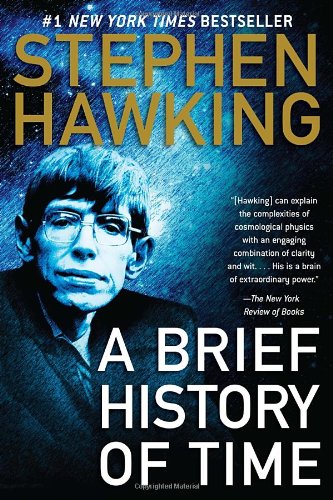This week I decided to re-read Stephen Hawking’s A Brief History of Time in which he describes the origins of the universe and the history of our attempts to understand the laws that govern it through science. In the book Hawking literally starts at the beginning, with the question of when time began, and if it existed before the beginning of the universe. He starts off by looking at some philosopher’s thoughts on the beginning of time, before going into an explanation of our current scientific understanding, say:
The questions of whether the universe had a beginning in time and whether it is limited in space were later extensively examined by the philosopher Immanuel Kant in his monumental (and very obscure) work Critique of Pure Reason, published in 1781. He called these questions antinomies (that is, contradictions) of pure reason because he felt that there were equally compelling arguments for believing the thesis, that the universe had a beginning, and the antithesis, that it had existed forever. His argument for the thesis was that if the universe did not have a beginning, there would be an infinite period of time before any event, which he considered absurd. The argument for the antithesis was that if the universe had a beginning, there would be an infinite period of time before it, so why should the universe begin at any one particular time? In fact, his cases for both the thesis and the antithesis are really the same argument. They are both based on his unspoken assumption that time continues back forever, whether or not the universe had existed forever. As we shall see, the concept of time has no meaning before the beginning of the universe. This was first pointed out by St. Augustine. When asked: “What did God do before he created the universe?” Augustine didn’t reply: “He was preparing Hell for people who asked such questions.” Instead, he said that time was a property of the universe that God created, and that time did not exist before the beginning of the universe.
Even if there was something that existed before the beginning of our current universe, as Hawking explains, any information about it would have been lost when our universe began. Just attempting to ponder what could have possibly existed before the beginning of the universe is enough to make one’s head hurt.
After giving a summary of our major scientific theories and discoveries, Hawking eventually gets to Albert Einstein and his theory of relativity. One of the major aspects of the theory is that time is not absolute. Each person, or observer, depending on their speed and location can experience the passage of time differently, in relation of another observer’s perception of it. As Hawking explains it:
An equally remarkable consequence of relativity is the way it has revolutionized our ideas of space and time. In Newton’s theory, if a pulse of light is sent from one place to another, different observers would agree on the time that the journey took (since time is absolute), but will not always agree on how far the light traveled (since space is not absolute). Since the speed of light is just the distance it has traveled divided by the time it has taken, different observers would measure different speeds for the light. In relativity, on the other hand, all observers must agree on how fast light travels. They still, however, do not agree on the distance the light has traveled, so they must therefore now also disagree over the time it has taken. (The time taken is the distance the light has traveled–which the observers do not agree on–divided by the light’s speed–which they do agree on.) In other words, the theory of relativity put an end to the idea of absolute time! It appeared that each observer must have his own measure of time, as recorded by a clock carried with him, and that identical clocks carried by different observers would not necessarily agree.
For example, for someone traveling at near the speed of light, they might experience the passage of a few years, only to return to earth and find that a few thousand years have passed there. Relativity also plays a very important role in the functioning of GPS satellites, where differences between the time on the satellite and that on the surface must be accounted for in order to accurately determine one’s location.
Although Hawking is talking about the actual passage of time, I was reminded of what Joshua Foer had to say in Moonwalking with Einstein in regards to our perception of the passage of time. We can find ourselves looking back at the past and wondering where the time went. As Foer explains, if we are not often having memorable moments, then our memories of our recent past will tend to blur together, leaving us with little to recall, and wondering what we did with our time, he says:
Monotony collapses time; novelty unfolds it. You can exercise daily and eat healthily and live a long life, while experiencing a short one. If you spend your life sitting in a cubicle and passing papers, one day is bound to blend unmemorably into the next–and disappear. That’s why it’s important to change routines regularly, and take vacations to exotic locales, and have as many new experiences as possible that can serve to anchor our memories. Creating new memories stretches out psychological time, and lengthens our perception of our lives.
Our brains tend to ignore and discard common occurrences, which is why we might get to work and realize that we don’t remember anything from the drive there. By frequently having new and novel experiences or adventures, we create more opportunities for memories to form and stick, thereby lengthening our perception of time when we later recall our lives, even though time might have felt like it sped up during the experience. The opposite of course also holds, during a boring or routine experience, our perception of time in the moment may make it feel like it goes on forever, then later we will likely find that we can hardly recall anything about it. This phenomenon is known as psychological time, which Foer explains with a quote from the pioneering psychologist William James:
William James first wrote about the curious warping and foreshortening of psychological time in his Principles of Psychology in 1890: “In youth we may have an absolutely new experience, subjective or objective, every hour of the day. Apprehension is vivid, retentiveness strong, and our recollections of that time, like those of a time spent in rapid and interesting travel, are of something intricate, multitudinous and long-drawn-out,” he wrote. “But as each passing year converts some of this experience into automatic routine which we hardly note at all, the days and weeks smooth themselves out in recollection to contentless units, and the years grow hollow and collapse.” Life seems to speed up as we get older because life gets less memorable as we get older.
By attempting to live a varied and interesting life although it may feel like it goes quickly at the time, we will be able to look back and recall many of the interesting experiences we have had and hopefully feel like we have lived a full life. Whereas if we fall into a routine and experience little variety we may feel like our life is long as we live it, but then later find ourselves looking back at our life and wondering where the time went, as we have little to show for it. The passage of time is relative, we therefore have a choice as to how we would like to experience it, and the way in which we live our life is how we go about making that choice.


